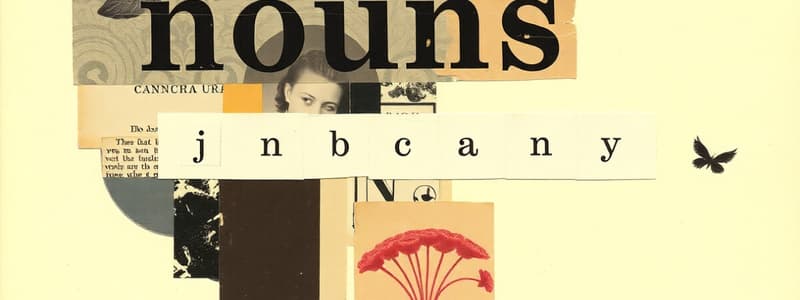Podcast
Questions and Answers
Which of the following is an example of a proper noun?
Which of the following is an example of a proper noun?
- city
- dog
- Paris (correct)
- freedom
Abstract nouns can refer to physical objects.
Abstract nouns can refer to physical objects.
False (B)
What type of noun is 'team'?
What type of noun is 'team'?
collective noun
An example of a concrete noun is a ______.
An example of a concrete noun is a ______.
Match the following nouns with their types:
Match the following nouns with their types:
Flashcards are hidden until you start studying
Study Notes
Identifying Nouns
-
Definition: Nouns are words that name people, places, things, or ideas.
-
Types of Nouns:
- Common Nouns: General names (e.g., city, dog, teacher).
- Proper Nouns: Specific names (e.g., Paris, Rover, Mr. Smith).
- Abstract Nouns: Names for ideas or concepts (e.g., freedom, love).
- Concrete Nouns: Names for things that can be perceived with the senses (e.g., apple, music).
- Collective Nouns: Names for groups (e.g., team, flock).
-
Identifying Nouns in Sentences:
- Look for words that can be preceded by articles (a, an, the).
- Check for words that can be pluralized (e.g., cars, dogs).
- Identify words that can take possessive forms (e.g., the dog's bone).
- Nouns often answer the questions: "Who?" or "What?"
-
Examples:
- People: teacher, athlete, friend.
- Places: school, park, country.
- Things: book, car, phone.
- Ideas: happiness, justice, beauty.
-
Tips for Identification:
- Use context clues to distinguish between different types of nouns.
- Practice by underlining or highlighting nouns in a passage to improve recognition skills.
Understanding Nouns
- Nouns name people, places, things, or ideas, serving as essential building blocks in language.
Types of Nouns
- Common Nouns: General terms not capitalized; examples include "city," "dog," and "teacher."
- Proper Nouns: Specific names that are capitalized; examples include "Paris," "Rover," and "Mr. Smith."
- Abstract Nouns: Represent intangible concepts or ideas; examples include "freedom," "love," and "justice."
- Concrete Nouns: Denote items perceivable through senses; examples include "apple," "music," and "car."
- Collective Nouns: Name groups or collections; examples include "team," "flock," and "class."
Identifying Nouns in Sentences
- Nouns can generally be preceded by articles such as "a," "an," or "the."
- They can be pluralized, changing from singular to plural forms (e.g., "car" to "cars").
- Possessive forms can be applied to nouns, indicating ownership (e.g., "the dog's bone").
- Often, nouns answer the questions "Who?" or "What?"
Examples of Nouns
- People: teacher, athlete, friend.
- Places: school, park, country.
- Things: book, car, phone.
- Ideas: happiness, justice, beauty.
Tips for Identification
- Utilize context clues in sentences to differentiate among various noun types.
- Practice identifying nouns by underlining or highlighting them in written passages, enhancing recognition skills.
Studying That Suits You
Use AI to generate personalized quizzes and flashcards to suit your learning preferences.




